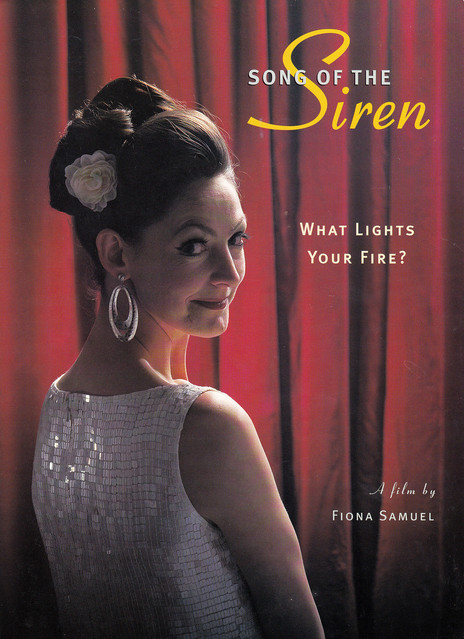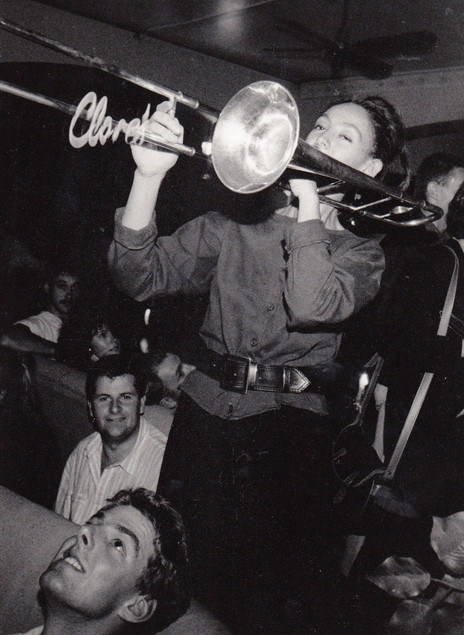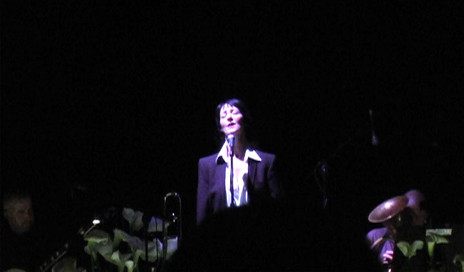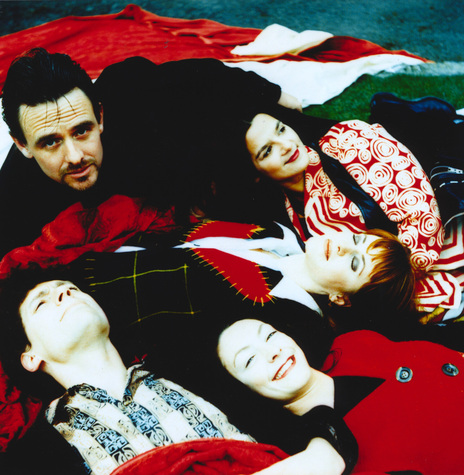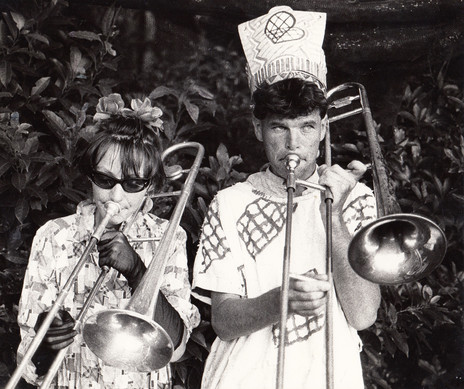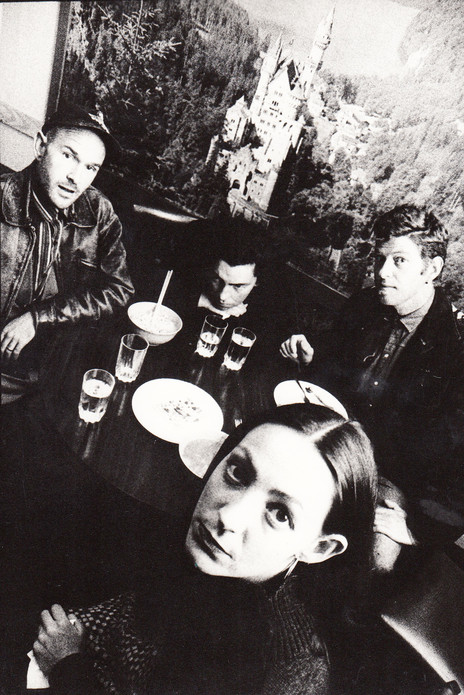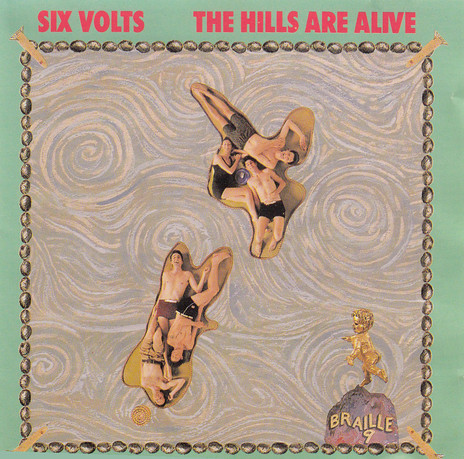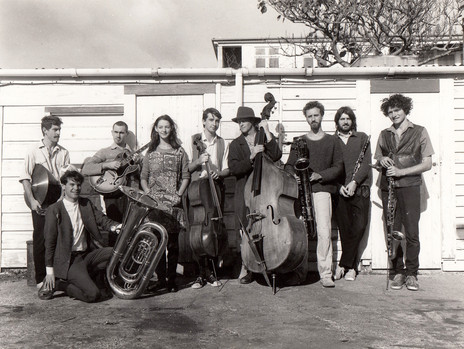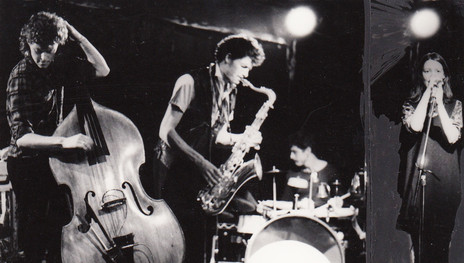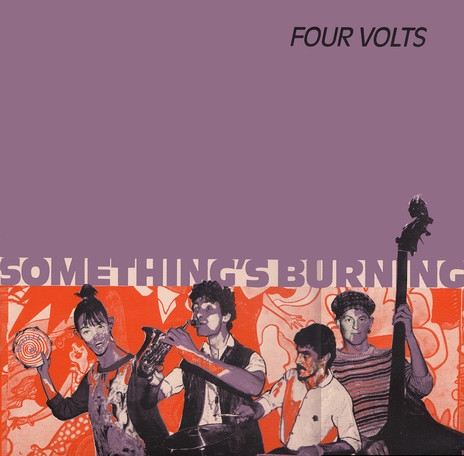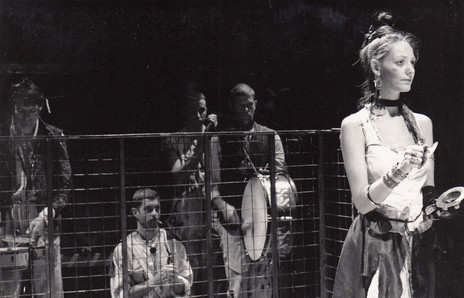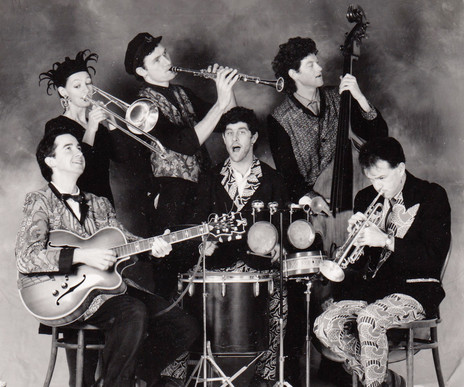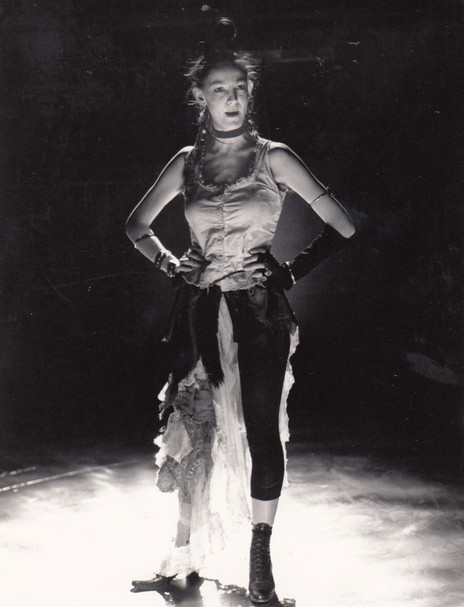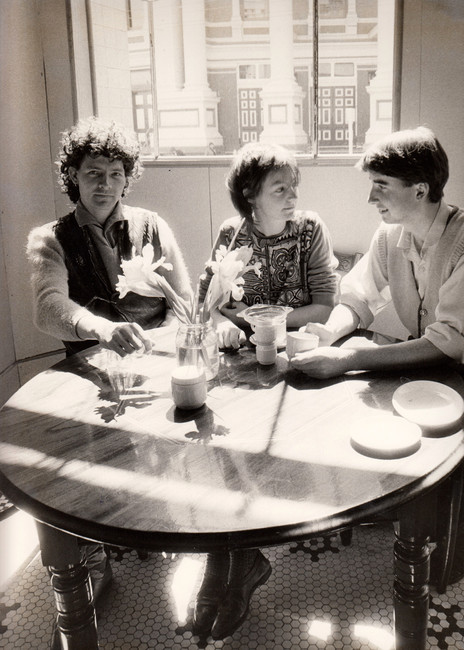While Roddick is recognisable as the singer and trombonist in the 1980s pioneering improv act the Six Volts, and for performances in shows like Threepenny Opera, The Songs of Kurt Weill and the Lord of the Rings symphony, she says there’s always been a constant tension for her between being the front person and being part of the band.
“I’ve never been driven to be that person out front. Collaboration has been the most important part of my career by far.”
Much of that collaborative work has been with her husband, David Donaldson, in a working partnership that began in 1984.
“Collaboration has been the most important part of my career by far.”
Janet Roddick was born in Hamilton in 1962, then moved to Lower Hutt where she attended Waiwhetu Primary School. From a young age Roddick was fascinated by music’s language. “I remember taking some sheet music to my mother and asking her to teach me how to read it.”
Roddick began piano lessons at age five and each week her mum, Pat, would take the children to the Lower Hutt Library where Janet would get the scores of her favourite musicals out to read. “I loved Gilbert and Sullivan and I just wanted to find out more about the music and how it worked. I’d sing along to records using my hairbrush as a microphone.”
She remembers lying about her age to be accepted for the senior choir at her school. “The teacher must have known I wasn’t that old, but I just wanted to do anything that involved music. It was exciting to sing with other people.”
In 1972 the Roddick family moved to Invercargill. Janet was in school productions and concerts at intermediate. “But I always stayed at the back of the stage.”
She began James Hargest High School in 1974, where they had a good music teacher and choir. Suzanne Prentice had attended the same school. Janet took any opportunity she could to sing in the school productions, working her way up to the main singing part in Salad Days by her last year. As a teenager she loved many of the torch singers of the 70s: Janis Joplin, Joni Mitchell, Carole King, Janis Ian and Barbra Streisand. Outside of school she took part in Invercargill Repertory and Operatic Society, but took no formal singing lessons.
“I didn’t think of that. You didn’t see people making a livelihood as musicians in Invercargill, it wasn’t an option.”
Invercargill was a conservative place and a rebellious streak had begun to show in her. Her mother held “women’s lib” groups at their house and at one point Janet started her own feminist group. After she won the school music prize in her last year, she was pulled aside by the school principal. “He told me that I’d never amount to anything if I didn’t learn to follow instructions. I’d refused to wear my hair in a ponytail to the school prizegiving.”
She left Invercargill in 1980, desperate get out of a place where “nothing was happening”. Aware that there weren’t enough women studying medicine, Roddick had plans to become a doctor. However, once she got to Otago University she realised she needed a change from sciences, and did a range of courses including auditioning for the music school. She was accepted for the performance programme at Otago under the tutelage of Honor McKellar. “I loved it. Honor was a brilliant teacher, energetic and really positive.”
At performance school Roddick was learning a range of classical singing techniques and discovered she liked contemporary classical music best. She was drawn to composers like Schönberg and Webern, because of the different styles of performing their music allowed. “I wasn’t interested in being cast as a love interest or as a prostitute dying of consumption. The soprano heroines were always dying, their parts never led to any action.”
Her flat in Dunedin was next door to The Chills and two doors down were The Verlaines. “I liked seeing them play, but I didn’t think what they were doing was where I was at. I would be practising classical scales in my room and next door they were rocking out!”
In her final year at Otago, she had her first professional gig at the Fortune Theatre in Sondheim’s Side by Side, working with Ann Pacey and Grant Bridger.
At the end of 1983 Janet left Dunedin. Encouraged at a summer school by Flora Edwards to move to Wellington, Janet attended Wellington Polytechnic as a second year student. But it was the flat she moved into at 23 Percival Street that had the biggest impact on the direction her life in music took. “I found myself living with artists and musicians, David Long, Rachel Lang, Katherine McRae and Shane Loader. Actors and musicians were coming through the flat all the time.”
The musicians Roddick was beginning to play with were a part of the Braille Collective, a loose collective of experimental musicians.
Janet started to sing with Neill Duncan, who was part of the Primitive Art Group, and David Long in a group called Jungle Suite. She says at first she found improvisation terrifying. “I’d only practise if the lights were out! I was making squeaky singing notes, joining in with the saxophone. We’d begin with a composition and then jump away from it. We were making experimental music, not doing jazz traditions. I’d use melody and phrases and improvise around chords. I’d sing words or bits of words and make gutteral, growly, spikey syllabic sounds. I was finding different ways to use my voice and after a while I began to enjoy it.”
The musicians Roddick was beginning to play with were a part of the Braille Collective, a loose collective of experimental musicians with whom she went on to have long term collaboration, including her future husband, David Donaldson.
In 1984, Roddick, David Donaldson, Anthony Donaldson and Neill Duncan performed together for the first time as the Four Volts. She began to develop her own style of delivery. The Four Volts would do standards like ‘The Girl from Ipanema’ or Bacharach’s ‘The Look of Love’ with Roddick sending up the typical delivery of these songs. “I’d keep a story I’d told myself about the song in my head as I sung. With a song like ‘The Look of Love’, I decided it was about rape or violence, and so I’d adjust how I sang that story. For me it was about what setting I could put a song into – that was how I found my own take on it.”
In 1985 she started to teach herself trombone. “I took up the trombone because I didn’t want to be quiet in the background, I wanted to be as loud as everyone else. It didn’t matter if the notes weren’t perfect, it was just part of the sounds we were making.”
It also came in useful for the Outsiders, the marching band that she took part in for protest marches held throughout the 1980s in Welington.
In late 1987 the Four Volts expanded to include David Long and Steve Roche and renamed themselves Six Volts. One of their first gigs was as the band in the The Threepenny Opera at Downstage Theatre, directed by Colin McColl with set design by Tony Rabbit. The band put their own interpretations on the songs.
In 1985 Janet performed in Happy End at Downstage and found she loved the music of Kurt Weill. Weill’s ‘Surabaya Johnny’ became a standard for Six Volts performances.
Janet says the Six Volts marked a step up professionally for them all. “We were serious about being professional and rehearsed everyday from nine to five at 30 Arthur St, treating it like a job.”
From 1985 until the recession in 1987, there were a lot of corporate gigs as well as regular restaurant and club gigs to earn money from playing. The Six Volts held a residency upstairs at Clare’s nightclub loungebar from 1988 to 1990 playing Friday and Saturday from midnight til 2am. The band toured New Zealand twice on Arts Council gigs where they were put up in billets, along with four other regional tours. During this time the band did all their own bookings.
The Six Volts performed as the band for the Front Lawn and in 1989 they toured to Edinburgh Fringe Festival.
Though she was the only woman in the band, Janet says she always felt listened to. “It helped that my partner was in the band. That was also a safety net for me being a woman out performing, always having David there at the end of the gig. As I went along I became more aware of other women who were performing around Wellington. Charlotte Yates, Jackie Clarke, Robin Nathan – we were all in the same world.”
In 1988 the Six Volts performed as the band for the Front Lawn and in 1989 they toured to Edinburgh Fringe Festival. They also wrote and performed the music for the theatre show, Aunt Daisy.
The Six Volts recorded two albums; The Hills Are Alive and Stretch, which Janet says was a mixed experience for her.
“I learned a lot about being in a studio but I always thought we were a better live band because of that improvisation, which was hard to capture on recording. We couldn’t hone our performances because the studio time was so expensive and as a collective we could never quite agree on what sounded best.”
In 1990, Six Volts did 90 gigs, toured around New Zealand three times, including playing at Sesqui at Waitangi. They also created music for a dance show, Flare Up, with Shona McCullagh, which they performed in Auckland and Wellington.
Their last gig together was at The Gluepot in July 1991. “We’d been together for a long time. I was getting more interested in pop, and others wanted to continue doing improvised jazz. We wanted to go off in different directions.”
Meanwhile, Big Fiddle took shape in 1990 as an opportunity for Janet Roddick, Callie Blood and Jackie Clarke to combine their strong individual voices in harmony. Taking inspiration from the Harris/Parton/Ronstadt Trio album, they worked up a repertoire of country-slanted material from sources as diverse as The Sons of the Pioneers and Elvis Costello, and enlisted Ian Morris on guitar and Nick Bollinger on bass to fill out the sound. Over the next couple of years they would play intermittently, mostly around Wellington with occasional excursions to Auckland, Christchurch and Nelson.
Following on from the Six Volts, Roddick formed the Brainchilds with David Donaldson, Steve Roche and Tim Robinson in which she sang, played organ and trombone. This time the songs were original, composed by Roche and Donaldson. They recorded two albums, Brainchilds and Roll.
In 1996, looking for different ways to earn a living, Roddick, Donaldson and Roche formed Plan 9. “David and Steve had bought some recording gear and we started teaching ourselves about sequencing, beginning on Master Tracks.”
Roddick continued to perform in productions: Babes in the Mood with Jackie Clarke; the opera Ricordi! about Katherine Mansfield, written by Peter Wells and directed by Colin McColl; Sing Whale; Taki Toru, as well as doing announcing on Concert FM and teaching singing at Toi Whakaari. She starred in a 1997 short film by Fiona Samuel, Song of the Siren.
Plan 9 began to get work scoring for films, most notably on the mockumentary Forgotten Silver, directed by Costa Botes and Peter Jackson. In 1999 Plan 9 with David Long began music editing and creating musical sound design on Peter Jackson’s Lord of the Rings, work that lasted until 2003. “It felt like the big time. It was incredibly exciting to be a part of this huge machine. We learned a lot about music editing very quickly.”
In 2003 Roddick performed in the Lord of the Rings Symphony with the NZSO.
Plan 9 and David Long contributed original music to Lord of the Rings and Roddick’s voice features throughout the second and third Lord of the Rings films as the “voice of the ring”. “I thought of the ring as a character. She’s seductive, drawing her victims to her; she’s a bad power. It was fun work to do because the voice was the raw material, then you go in and shape it with effects and layers.”
In 2003 Roddick performed in the Lord of the Rings Symphony with the NZSO, conducted by composer Howard Shore in Wellington and John Mauceri in Taipei.
Roddick returned to Kurt Weill’s music in 2006 after festival director Carla van Zon had suggested putting a programme of songs together for festival audiences. With David Donaldson, Steve Roche, David Long, Jeff Henderson and Chris O’Connor, and Roddick singing and playing instruments, she says this show was a highlight for her. “The characters and stories in the songs are so strong. I loved that feeling of being able to get into character and feel a connection with the band and the audience.”
As well as their work on Peter Jackson productions King Kong and the Hobbit films, Plan 9 continues to compose scores for dozens of films and TV shows, such as Predicament (2010) and Antarctica: A Year on Ice (2013). Roddick says she especially enjoyed working with large orchestral ensembles but her favourite thing is working collaboratively.
“Working in bands and then in Plan 9 has given me a real sense of support. You can lean on others to come up with solutions and get feedback for your own work. I’ve been collaborating with David for 35 years now. We help each other all the time, we understand each other. I’m lucky.”
